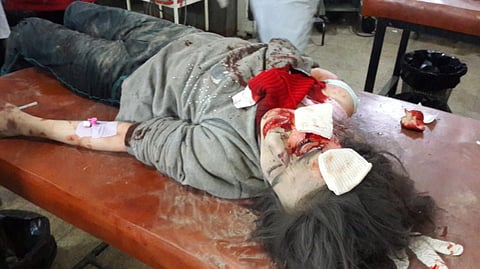UN draws up lists of Syria war crimes perpetrators
Panel pushes for naming accused, who include army commanders and heads of detention centres

United Nations: A UN panel investigating potential war crimes in Syria’s civil war threatened on Friday to release a closely guarded list of names of those it accuses of having raped, tortured and carried out executions during the conflict. The move was part of an effort to increase pressure on world powers to pursue justice for what it calls crimes that “shock the conscience of humanity.”
The confidential lists — four have been compiled, and a fifth combining all of them is under way — contain scores of names, according to the Independent International Commission of Inquiry on Syria, and have been seen by no one other than its four members. The commission, in a report released on Friday, said it was considering releasing the names at the annual meeting of the Human Rights Council next month, saying that not doing so “at this juncture of the investigation would be to reinforce the impunity that the commission was mandated to combat.”
The report, the ninth released by the commission, said the confidential list of names included “commanders of army and security units, including heads of detention facilities and other individuals operating under the command of the government or in its support, and commanders of non-state armed groups, including the so-called ‘emirs’ of radical groups.”
What it would take for the panel to decide to publish the names remained unclear. Speaking to reporters in New York on Friday morning, the chairman of the commission, Paulo Sergio Pinheiro, said only that victims had the right to know and that he and his fellow commissioners would make a decision in the coming weeks. “We have not decided yet,” Pinheiro said before he and his fellow members went into a closed-door informal session of the Security Council.
Another member of the commission, Vitit Muntarbhorn, said the panel was “considering the pros and cons of whether or not to release the list.” He said the commission had refrained from revealing the names to this point in consideration of their due process rights.
The threat to release the names reflects not only the mounting frustration of the panel, which has spent the last three years chronicling suspected war crimes by all sides in the Syrian conflict. It also exerts new pressure in particular on Russia, which vetoed a draft Security Council resolution last spring to refer the situation in Syria to the International Criminal Court. Russia backs the Syrian government and, as a permanent member of the Security Council, wields veto power.
“That perpetrators have, for more than four years, committed crimes that shock the conscience of humanity raises questions about the inadequacy of the response of the international community,” the commission concluded in the report released on Friday.
Pinheiro, of Brazil, insisted that his commission’s mandate was “to not ask for the possible.”
“We must ask for what is right for the victims of Syria,” he said. “We are trying to mobilise the international community to consider all options on the table for actability and not to ignore the horrible situation.”
Balkees Jarrah, a senior counsel at Human Rights Watch, said her organisation welcomed the potential publication of names. “The ball is now in the Security Council’s court to ensure that there is a concrete process to prosecute perpetrators,” she said. “High-ranking individuals on all sides should already be on notice that they could be held criminally responsible for war crimes by forces under their command.”
The Syrian ambassador to the United Nations, Bashar Al Jaafari, dismissed the commission and its report as biased.
“All this propaganda is aimed at diabolising the Syrian government,” he said.
— New York Times News Service


